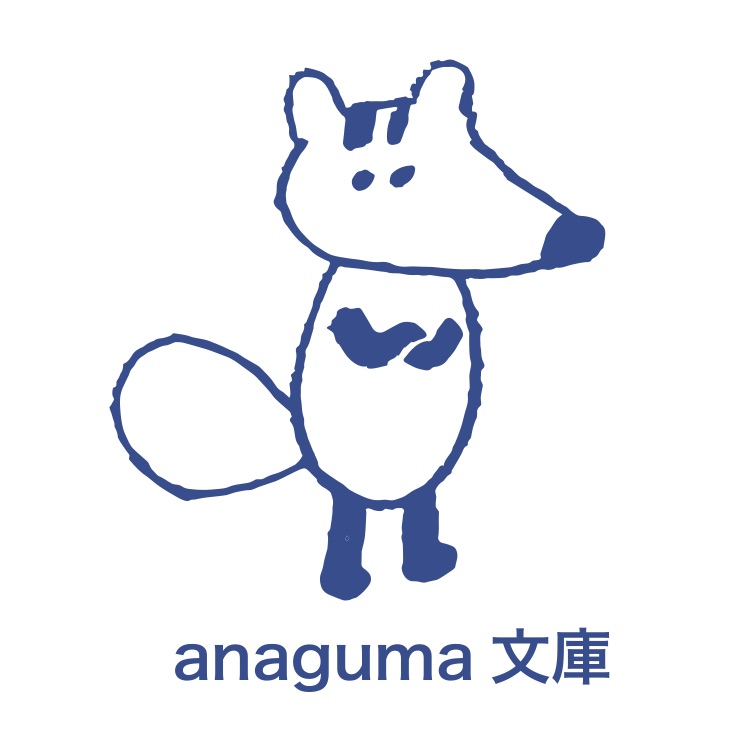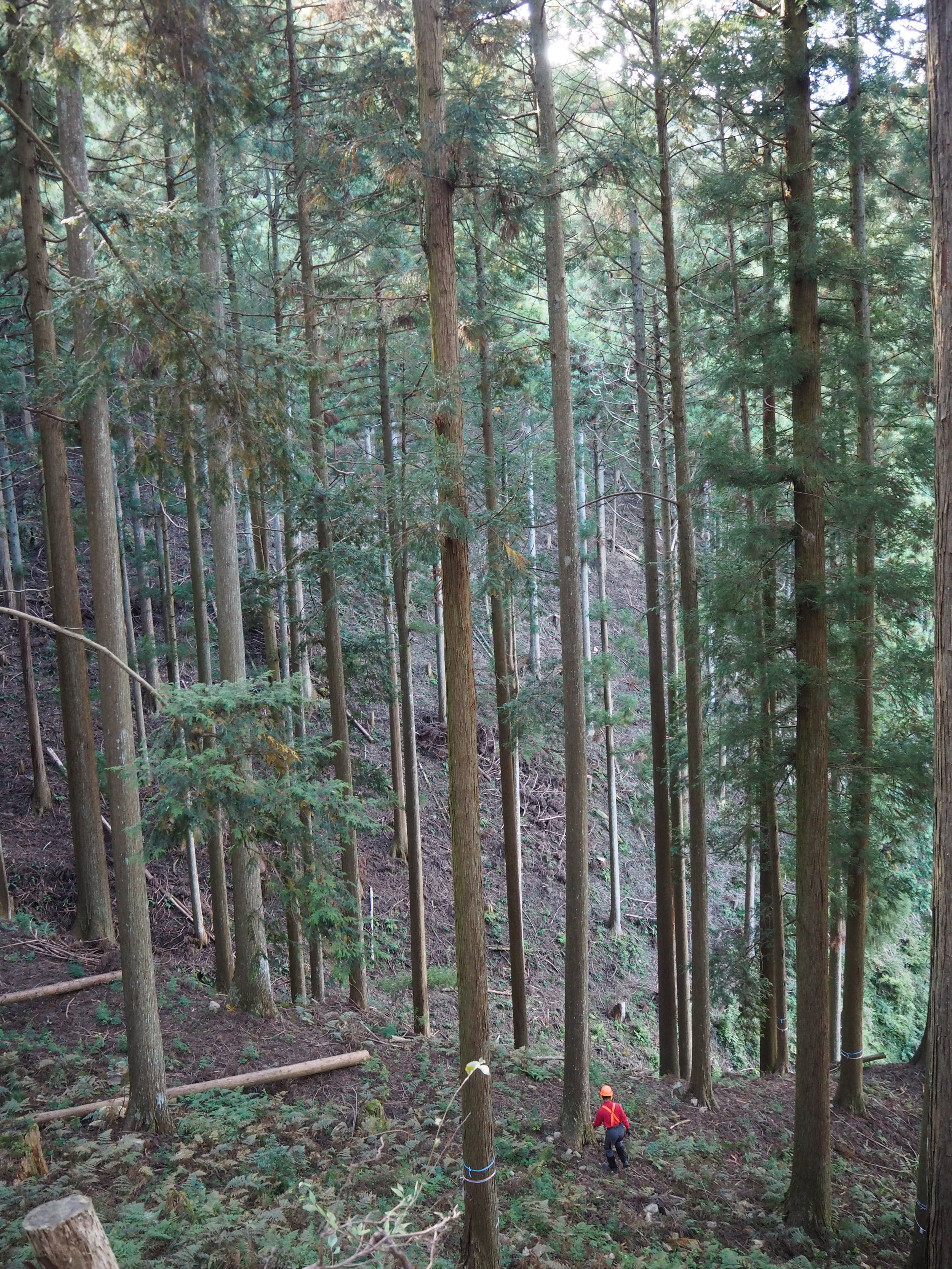(Please scroll down for the English version.)
木について語る:山を守る人と、人を守る山
毎年春から、玉井久勝さんは野球の試合で審判する。夏の盆踊りを準備から片付けまで、玉井さんは主役的な役割を果たしている。消防団の分団長と山岳救助隊隊員を含めて、玉井さんの肩書きが十九個になる。「人と関わるのが好きだから、こうなった」と本人は言う。英語で言えば、玉井さんは「帽子をたくさん被る」という表現を使うだろう。しかし、玉井さんが何よりも被るのは帽子ではなく、ヘルメットだ。
玉井さんは山を管理する「山守」だ。野球の監督が試合の様子を見て、選手を換えたりすると同じように、玉井さんは山の様子を見て、吉野杉とヒノキの木を間伐したり、伐採したりする。密植された木をちゃんと育てるために、草刈り、枝を切る「枝打ち」、間伐の作業を定期的にする必要がある。他の仕事と違って、毎日こつこつとした仕事の成果が見えるのには年数がかかる。「木を育てるにはすごい時間がかかる」と玉井さんは言った。「野菜とかだったら、春に植えたら秋に収穫できるけど、山はそうならない。スパンが長くて、成長が遅い。。。でも、風や雪で倒れる時はいっぺんや」と玉井さんは苦笑いで言った。「自分が育てた山がだんだん大きくなっていくのを見るのはやっぱり達成感がある。若い時はあまりそう思わなかった。」
密植された、繊細な年輪で有名な吉野杉を育てるのはかなり時間がかかる。山守は山で切った木を原木市場まで運んで、競売する。昔は、吉野杉とヒノキがよく売れたが、だんだん苦しくなった。「日本の文化が変わって、木材の使われ方が変わり、消費量が減って、外材が入ってきて、国内の材木の値段が下がった。」と玉井さんはそれについて正直に言ってくださった。林業の不安定はもう一つの課題とつながっている:山守の後継者を見つけることだ。
玉井さんに山のことを聞いてみたら、ストーリーが始まる。彼の目が輝き、彼の声が鮮やかになる。人好きな玉井さんは何年か前から子供たちと山の話をしたり、若者を山に連れて行ったりしている。山で吉野林業の基本を教えて、間伐を体験させる。玉井さんは若者と意見交換をしながら、いつも仲良く交流している。もちろん教育の目的もあるが、この川上村で木を大事に作っているということが分かってもらったら、それは商品とつながるかもしれない。「例えば、木のテーブルと鉄のテーブルがあって、どっちを買うとしたら、木のテーブルにしてほしい。」と玉井さんは言った。「そのうち興味があったりしたら、そういう作る現場にも参加したいという人ができてくると、仕事をしてくれる人が現れるかもしれない。」
玉井さんは山に行く前に、まず、山の神にお参りする。一月、六月、十一月の七日である「山の神の日」には山で仕事をしないということも決まっている。危険な現場で働いている山守たちは山の神に見守られていると言ってもいいかもしれない。私たちは山を大切にしたら、山に大切にしていただくような気がする。少なくとも、僕はそんな印象を受けている。私たちの使う木、私たちの飲む水、下流へ流れる川が山々で生まれる。私たちに不可欠なものを使い続けるために、山を大切にしなきゃ。
Talk On Wood: People Who Protect Mountains, Mountains That Protect People
Every spring, Hisakatsu Tamai starts umpiring baseball games. He is a central figure from the preparation to the clean-up of the Bon festival in the summer. Including captain of our Volunteer Fire Dept. unit and a member of the Mountain Rescue Squad, his titles continue 19 lines down the page. “I like interacting with people, so it turned out like this,” he said. In English, we’d say that Mr. Tamai “wears many hats”. However, the thing he wears more than anything is not a hat, but a helmet.
Mr. Tamai is a yamamori, a manager of the mountains. Just as a baseball manager watches how a game goes and replaces players accordingly, Mr. Tamai watches how a mountain develops, while thinning and chopping the Yoshino cedar and cypress. In order to properly raise these densely planted trees, one must regularly cut grass, chop branches, and thin the forest. Unlike other jobs, the results of the daily grind only come decades later. “It takes a very long time to grow a tree,” Mr. Tamai said. “With vegetables, you plant them in spring and harvest them in autumn, but these mountains aren’t like that. It’s a long span and the growth is slow…but when the trees fall down, it’s right away,” he said with a wry smile. “Of course, it’s fulfilling to see the mountains I’ve looked after gradually grow and develop. When I was younger, I never felt that.”
Densely planted and famous for its fine rings, Yoshino cedar takes a long time to grow. Eventually, yamamori transports the trees from the mountains to the lumber market and auctions them off. In the past, Yoshino cedar and cypress sold very well, but it has gradually become a struggle. “Japanese culture changed and the way lumber is used also changed, with people consuming less wood and the introduction of foreign materials, the price of domestic lumber went down,” Mr. Tamai told me honestly. The instability of forestry is connected to another issue: finding yamamori successors.
If you ask Mr. Tamai about the mountains, the story starts. His eyes light up and his voice becomes animated. A people-person, for years Mr. Tamai has talked with young people about the mountains and taken them into the mountains. He teaches them the basics of Yoshino Forestry and allows them to experience tree-thinning first-hand. Mr. Tamai and the young people share opinions with one another and always seem to get along very well. Of course the purpose is educational, but perhaps if people understand that trees are so carefully grown in Kawakami Village, that might lead them to a wood product down the line. “For example, if there’s a wooden table and metal table, and they’re going to buy one, I want them to choose the wooden one,” Mr. Tamai said. “At some point, they might be interested and want to come participate on-site where we grow these trees, so someone might come here to work.”
Before Mr. Tamai heads into the mountains, he first pays respect to the God of the Mountain. On the 7th of January, June, and November, known as the “God of the Mountain Day”, no one dares to go into the mountains. You might be able to say that the yamamori, who work in a dangerous environment, are being watched over by the God of the Mountain. It seems like if we take care of the mountains, the mountains will take care of us as well. At least, that’s the impression I get. The wood we use, the water we drink, the river that flows downstream are all born in the mountains. In order to continue using these essentials, we need to take care of these mountains.




